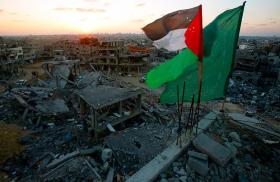For many long years it was fair to describe the development of Saudi Arabia's foreign policy in terms of the "dynamics of inaction." The Wahhabi royal house followed an essentially cautious, awkward, defensive path of diplomacy, rarely taking the initiative, and prefering to remain in the shadowy realm of influence from behind the scenes. Recently, it appears, King Abdullah and his close aides have come to the conclusion that Saudi Arabia has to change gear and go into active mode in all the relevant spheres. Over the past few months, there has been a succession of developments that, together, have thrust Riyadh into a leading role. The Saudis are no longer waiting for anyone, but are forging ahead by themselves.
The main reason is that the Saudis are likely despairing at the impotence of the Arab League, as well as at the institution of the Arab summit. Moreover, the Saudis have realized that the Egyptians, with whom they have worked in partnership on and off since the days of King Faisal in the 1970s, can no longer fulfill all the roles they used to take upon themselves in the past.
One example of the new Saudi activism: They are proposing -- though not publicly, yet -- an open dialogue with Israel, on condition that Ehud Olmert agrees to discuss the original Saudi-formulated "Arab Peace Initiative," as presented at the Beirut Summit of 2002. This was the subject of the October meeting in Amman between the Israeli prime minister and Prince Bandar, the former Saudi ambassador to Washington, who has become a senior national security adviser to the royal court. The initiative constitutes a Saudi attempt to reboot the peace process, in order to allow quiet in the Palestinian arena and to block Iranian trouble-making in the region.
In Lebanon, the Saudis have been acting since the war as a generous and dependable patron of the "March 14" camp, the coalition of anti-Syrian forces and the Siniora government. It is not only the old link with the family of murdered Lebanese former prime minister Rafiq Hariri that provides the basis for this approach, but again, an effort to stop the radical Shi'ite offensive, as embodied by Hizballah. The Saudis are quietly mediating between Siniora and some of his adversaries to prevent the collapse of the Beirut government. They are also pouring money into its coffers to allow it to compete with Hizballah's Sheikh Hassan Nasrallah in winning over the population by repairing the war damage. And finally, Saudi is freely heaping harsh criticism on Hizballah.
When it comes to Syria, the Saudis have adopted a tough stance that is obviously raising the heckles of President Bashar al-Asad. The Saudis are not inclined to help snatch him from the talons of those investigating the Hariri murder. On the contrary, they are openly siding against him, by inviting the prime opponents of his regime to Riyadh. Recent guests have included Abd al-Halim Khaddam, the now-exiled former deputy president; Sadr al-Din al-Bayanuni, leader of the Syrian Muslim Brotherhood; and Rifaat al-Asad, Bashar's estranged uncle who resides in Spain.
The Saudis have become critical of the Muslim Brotherhood movement in general, and in particular, of its Palestinian branch, Hamas. Prince Naif, Saudi's powerful interior minister, accused the MB of "ingratitude" after all the help the organization had received from Saudi when it was being persecuted in Egypt in the 1950s, 60s and 70s. When Hamas's Khaled Mashal came to Saudi for the Hajj pilgrimage he was chided for the extremism he displays. The informal alliance between Saudi Arabia and the Brotherhood is beginning to dissolve.
And in Iraq, the most important arena of all, the Saudis are working to promote Shi'ite-Sunni reconciliation through the "Mecca Conference," grouping together Shi'ite and Sunni religious dignitaries in the hope of limiting the scope of terror and encouraging an arrangement that will preserve the unity of Iraq, and prevent it from breaking up into three statelets.
This new Saudi dynamism, which is aimed chiefly at creating a moderate and active camp in the Middle East against Al-Qaeda and Iran, deserves Israel's attention. It presents a possible opportunity that warrants further exploration. First up could be an exchange of clarifications regarding Riyadh's latest interpretations of the "Arab Peace Initiative." Would it be possible to reach a prior understanding that would allow Olmert to declare his readiness to discuss the 2002 plan, without obliging him to accept it as given? The two countries also have common interests when it comes to Iran's nuclear ambitions, since the Saudis have begun to sound warnings that an atom bomb on one side of the Persian Gulf will make it imperative for those on the other side to obtain one too.
Because of the Saudis' conservatism and love of ambiguity, they won't tolerate unnecessary leaks, such as those to the Israeli press following the meeting with Bandar. Such a dialogue will require a secret channel between Jerusalem and Riyadh that is reliable and efficient. There are plenty of ways to build one. Hopefully, without our knowing about it, such a channel already exists.
Ehud Yaari is an Israel-based associate of The Washington Institute and associate editor of Jerusalem Report. He is the author of Toward Israeli-Palestinian Disengagement and Peace by Piece: A Decade of Egyptian Policy.
Jerusalem Report


